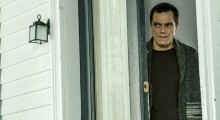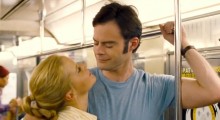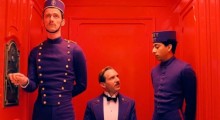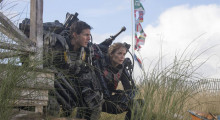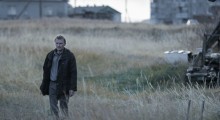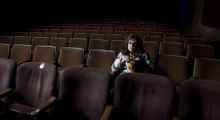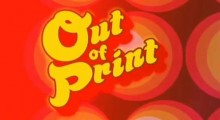35mm
-
“The Mid-Size Studio Feature is Gone”: Ken Kwapis on A Walk in the Woods

When Ken Kwapis was a cinema student at USC, he ran the school’s film society and programmed retrospectives that enabled him to not only study the classics but also to meet several of the directors who made them – among his guests were Orson Welles, John Cassavetes, and Don Siegel. The experience clearly influenced Kwapis when he became a director himself, as he forged a career similar to that of many of the filmmakers of the classical studio era, albeit without the same corporate support system. Like a Michael Curtiz or Victor Fleming, Kwapis employs a self-effacing style and often […]
by Jim Hemphill on Sep 2, 2015 -
Steering Away From “Ooga-Booga” Horror Movies: John McNaughton on The Harvest

In 1985, a pair of brothers who owned a video equipment rental business in Chicago offered local filmmaker John McNaughton $100,000 in financing if he could come up with a low-budget horror movie. They probably got a little more than they bargained for when McNaughton delivered Henry: Portrait of a Serial Killer, a chilling (though also blackly comic) character study loosely based on the experiences of real life sociopath Henry Lee Lucas. McNaughton eschewed slasher movie conventions in favor of an ultra-realistic, serious-minded film with no escape hatch for the audience; one of the greatest cinematic representations of the banality […]
by Jim Hemphill on Aug 19, 2015 -
“It’s Almost Impossible to Watch Something That was Shot on Film Projected on Film”: DP Jody Lee Lipes on Trainwreck

The Judd Apatow-directed Trainwreck is being hailed as a breakthrough for much of its cast. It’s turned Amy Schumer – who stars as a monogamy-challenged New York magazine writer — into a movie star, Bill Hader into a leading man and LeBron James into his generation’s Bruno Kirby. But the film is an equally big break for the man behind the camera – Trainwreck cinematographer Jody Lee Lipes. In the past, Apatow has opted for veteran d.p.’s with intimidating credits. Unforgiven’s Jack Green shot The 40-Year-Old Virgin. Schindler’s List’s Janusz Kaminski lensed Funny People. On Trainwreck, Apatow turned the camera over to […]
by Matt Mulcahey on Jul 27, 2015 -
Going Mobile: The Alpha1 Mobile Film Lab

In 1932, the Russian filmmaker Alexander Medvedkin convinced Soviet authorities to give him three decommissioned train carriages to turn into a mobile film studio. The “film-train” would travel across the USSR’s expanse, bringing with it 32 spots to sleep, six editing tables, a projection room and a film-processing lab. Equipped to handle all aspects of production and projection from beginning to end, the film train would record local issues and expose problems that the people would need to solve: in Medvedkin’s words, the portable facility would act as “a kind of special fire brigade to put out problem fires.” These […]
by Vadim Rizov on Jul 23, 2015 -
“I Don’t Want to Sound Negative About Digital”: DP Robert Yeoman on NAB Show, The Grand Budapest Hotel and Shooting Film

From April 11-16th, more than 100,000 tech heads and industry professionals will descend upon Las Vegas to gorge themselves on the latest cameras, lights and gadgets at the annual NAB Show. Nestled among this digital idolatry, you’ll find at least one psalm to the archaic when cinematographer Robert Yeoman takes the stage to talk the miniatures, stop-motion animation and 35mm photography of The Grand Budapest Hotel. Yeoman will be featured as part of NAB Show’s Creative Master Series on April 13th in a conversation with American Cinematographer managing editor Jon Witmer titled “Checking into The Grand Budapest Hotel.” Sponsored by […]
by Matt Mulcahey on Apr 8, 2015 -
Dan Berger on Why Oscilloscope is Selling Their 35mm Prints on Craigslist

A somewhat unsettling Craigslist ad made the rounds on Twitter on Wednesday night, offering up “indie film prints” for the grand total of $1. The dollar was a placeholder, but the offer was very much real: Oscilloscope was “cleaning (ware)house” and looking to sell 35mm prints of Wuthering Heights, We Need to Talk About Kevin, and a handful of others to the highest bidder. Though the post is now flagged for removal, I reached out to Oscilloscope’s Dan Berger about why the company was trying to find a new home for their own property. Immediately, he assured me that the future availability of […]
by Sarah Salovaara on Mar 13, 2015 -
39 Movies Released in 2014 Shot on 35mm

Last year, I posited that Boyhood‘s use of 35mm seemed to be a kind of special effect as much as anything: committing to film ensured an internally continuous look over 12 years of production whose uniqueness would survive despite a digital intermediate and no prints being struck for American release. This type of use of 35mm, separate from its ongoing viability as an exhibition format, was one common reason cited for its use in 39 2014 US releases originating in whole or substantial part from it. That’s a list that’s probably not complete: collating the release calendar against the technical specifications primarily quickly […]
by Vadim Rizov on Jan 15, 2015 -
“A Little Person Against the Government Machine”: Andrey Zvyagintsev on Leviathan

When Andrey Zvyagintsev brought Elena — his corrosively apocalyptic attack on the Russian oligarchy— to Cannes in 2011, he was alternately direct and evasive about its pessimistic national diagnosis. One interviewer was informed Zvyagintsev had considered calling the film Invasion of the Barbarians, but was another was told that focusing on class issues was missing the larger moral point. Much has changed in three years, and in interviews Zvyagintsev has been adamant that his fourth feature isn’t exactly what it appears to be — i.e., another head-on broadside against different segments of Russia’s ruling class. Leviathan can be unreductively considered a direct continuation/extension of Elena‘s line of argument, not least in again […]
by Vadim Rizov on Dec 25, 2014 -
Julia Marchese on The New State of The New Beverly and 35mm

Cinephiles on both coasts were rattled by Julia Marchese’s blog post last Friday entitled “I Will Not Be Censored,” concerning her departure from Los Angeles’ beloved New Beverly Cinema. Anyone who’s been to the New Bev within the last dozen years will recognize Marchese, for many the welcoming public face of the recently beleaguered rep house. But following a steady trickle of involvement from Quentin Tarantino — first paying the theater’s bills out of love, then becoming its owner, and finally, in September, announcing he’ll be directing a majority of the programming — Marchese was isolated within the staff, and […]
by Steve Macfarlane on Oct 27, 2014 -
Watch: New Beverly Ex-Manager Julia Marchese’s Documentary on 35mm and Rep Cinema

For many years one of the public faces of Los Angeles’ New Beverly Cinema, today Julia Marchese posted an unnerving account of her experience since Quentin Tarantino became the theater’s owner and programmer. It’s worth reading in full, but the gist is that Tarantino’s team put inexplicably tight social media muzzles on all staff and effectively fired (“demoted”) Marchese less than two weeks after her promotion to a managerial role. In short: her hopes dashed for a New Beverly 35mm premiere of her documentary Out of Print — about the importance of 35mm repertory cinema in general and the theater […]
by Vadim Rizov on Oct 15, 2014

